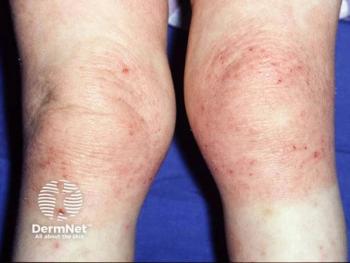
Experts on Results of JAK Inhibitor vs Systemic Immunosuppressant Safety Study
Experts discuss the results of a study comparing the safety of Janus Kinase (JAK) inhibitors and systemic immunosuppressants in the treatment of atopic dermatitis (AD).
Episodes in this series

Christopher Bunick, MD, PhD: One of the tables in this particular paper highlights the actual event rates per 100 patient-years seen for abrocitinib [Cibinqo] in 15 mg and 30 mg dosing, abrocitinib 100 mg and 200 mg dose, and then methotrexate, cyclosporine, and systemic corticosteroids. First we looked at malignancy, and what we found was that the JAK [Janus kinase] inhibitors were equal or lower event rates for 100 patient years for malignancy compared to all methotrexate, cyclosporine, and steroids. If we looked at nonmelanoma skin cancer, kind of the same thing, that the event rates for nonmelanoma skin cancer were equal or less than the event rates for the other traditional immunosuppressive, in particular steroids for this particular adverse event. When it came to MACE [major adverse cardiovascular events] and VTE [venous thromboembolism], the event rates for the JAK inhibitors again were equal or lower to the event rates for these other traditional agents with the caveat that there wasn’t a lot of data on the cyclosporine related VTE events. So, in conclusion, what we observed was that on average, the event rates from methotrexate cyclosporine and systemic corticosteroids were higher than the JAK inhibitors for these adverse events or special interests. And how does this help us clinically? Well, if you’re trying to develop a treatment pyramid, it suggests actually that the JAK inhibitors should be considered ahead of these traditional immunosuppressive patients for atopic dermatitis [AD] patients, and with respect to systemic corticosteroids, systemic corticosteroids were the highest. They had the highest event rates per 100 patient-years of any of these medicines.Ruth Ann, could you comment on this finding about steroids? Does it surprise you? And how does this impact how you use systemic steroids in your clinic?
Ruth Ann Vleugels, MD, MPH, MBA: Chris, it doesn’t surprise me, and it hasn’t changed my practice much because I’ve been avoiding systemic steroids as much as I can for years but again, I know that that’s not probably the traditional way most physicians in the country are approaching AD in particular. Again, I come from this biased background where when I see a new cutaneous lupus patient, I don’t want to give them systemic steroids. I know it’s not a good off-switch. I want to give them something else. I feel the same about AD. I never want to reach for systemic steroids. I really don’t want to use them because they have so many comorbidities and I really want to reach for agents that give me longer term more effective control, so I’m really trying to use systemic steroids extremely rarely, and these days I don’t have to use them almost ever. Obviously, in the past, I wasn’t that fortunate. But currently, there’s not often very many instances where I would really need to reach for systemic steroids in a patient with AD. I think that’s just really a mind shift change because, as dermatologists, many of our colleagues have been comfortable prescribing systemic steroids for years. So it seems like perhaps the best solution for the patient because it seems like perhaps you could help their disease and avoid another type of therapy, but really similarly to our other inflammatory and autoimmune diseases, we know these are chronic diseases. I think a perfect example would be you wouldn’t have a psoriasis patient walk into your clinic now and think you could give them perhaps a short course of systemic steroids or something else for the short term and then they would just be fine and they not have to suffer from their disease anymore, and that’s the same way we need to think about AD. We need to give them a solution that’s going to be a long-term option for them, and I think that’s just really important. It just emphasizes the fact that systemic steroids, not only from an efficacy standpoint but also from the safety standpoint, is they’re really not a great choice for our patients.
Christopher Bunick, MD, PhD: I couldn’t agree with you more. I do not use systemic corticosteroids ever for my eczema patients. I refuse to give them when patients ask for them. I say no. I really think that steroids in my opinion should be contraindicated in AD patients or the therapy of absolute last resort. You mentioned, I think, that you give them to patients for that immediate short-term comfort but we’ve been talking about some of the science that the JAK inhibitors have a very rapid onset of action because of where they work inside the cell, yet we also just saw safety data and as well as efficacy data from the network meta-analysis showing that the JAK inhibitors are also safe and effective over the long term. So you mentioned thinking about putting these patients on a treatment for the long haul but it seems to me that the steroids are not that therapy.
Ruth Ann Vleugels, MD, MPH, MBA: Again, I may be alluding to something I mentioned earlier. I’ve been fortunate to be able to use JAK inhibitors for nearly a decade given the diseases that I treat. Many of my patients have been on JAK inhibitors for 5, 6, 7, or 8 years even, and I think this is really important to think about the fact that I would prefer to have a patient on a JAK inhibitor for that duration or longer, very easily and much more readily than I would prefer for them to be on systemic steroids and there’s no question about that in my mind for my patient population.
TRANSCRIPT EDITED FOR CLARITY
Newsletter
Like what you’re reading? Subscribe to Dermatology Times for weekly updates on therapies, innovations, and real-world practice tips.




























